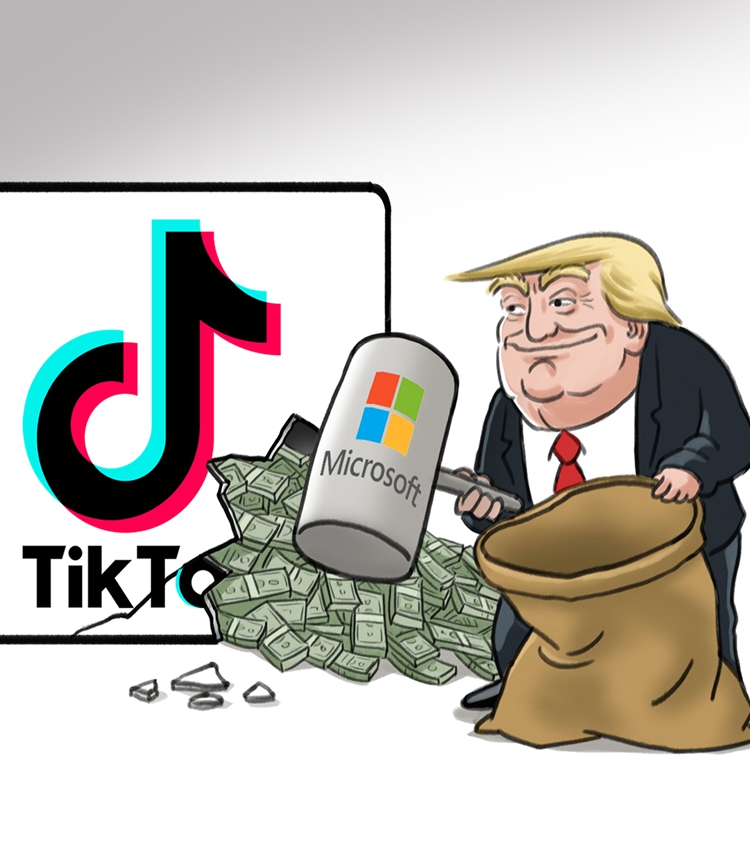US WeChat users sue over Trump exec order
By GT staff reporters Source: Global Times Published: 2020/8/9 22:53:40
Rule of law in US ‘far less reliable than we thought’

A user swipes on his smartphone while WeChat logos appear in the background, 14 May 2020. Photo: IC
An alliance representing WeChat users in the US has been initiated by several Chinese American lawyers to revoke a presidential executive order targeting the Tencent-owned messaging app.
It marks a fresh move to rise against a US-inflicted iron curtain that intends to block itself from contacts with Chinese technologies and solutions - the next big things invoking fear within "a declining superpower," said experts.
The legal action, adding to TikTok owner ByteDance's statement Friday that it will resort to legal action if the US government fails to treat it in an equitable way, indicates that Chinese businesses are also prepared to use litigation to fight against the Trump administration's groundless suppression, experts said.
They are set to face a tough legal battle, nevertheless, they noted, citing the US legal system that vests the president with executive power at his discretion when wielded in cases of national security protection and suppression of the kind that goes well beyond the legal sphere.
Trump signed an executive order on Thursday banning all US transactions with Tencent on grounds of national security after 45 days, or September 20. A parallel executive order signed on Thursday also blocks all US deals with TikTok's Chinese parent ByteDance after 45 days.
The suffocating move hammered Tencent shares in Hong Kong trading on Friday, even though WeChat users in the US as a percentage of its entire user population remain tiny.
A Tencent spokesperson told the Global Times on Friday that the company is reviewing the executive order to get a full understanding.
The executive order targeting WeChat, tantamount to a complete ban on the messaging and payments app, violates the US Constitution, the Administrative Procedure Act, among other rules, according to a posting on Sunday on the public WeChat account of US law firm Ying Cao Law LLC.
If the executive order is strictly followed, individuals or entities in the US will not be allowed to download or update WeChat via the app stores of iPhones or Android devices, read the posting, a donor funding proposal for safeguarding US WeChat users through the creation of the US WeChat Users Alliance.
The transactions to be banned would not be identified until 45 days after the date of the order, said the proposal, estimating that the ban could mean that no one in the US could use WeChat's messaging functionality, let alone its transfer and payment features, thereby having a great impact on the life and work of several million Chinese Americans and other people who have enjoyed the great benefits and convenience brought by WeChat.
Violations of the executive orders issued under the International Emergency Economic Powers Act (IEEPA) could face civil penalties of over $300,000 per transaction as well as criminal penalties, according to the IEEPA of the US.

Trump administration's daylight robbery, blatant intimidation to "smash & grab" from TikTok.Illustration:Liu Rui/GT
The alliance claimed that it does not represent the interest of any parties, governments, or Tencent, and it will file a lawsuit with the federal court system and asks for the order to be invalidated. It plans to file the case within 10 days. Tencent has yet to comment on the legal action.
The office of the US president has power to issue executive orders on national security grounds, Hao Junbo, chief lawyer at the HAO Law Firm in Beijing, told the Global Times on Sunday.
It would be difficult for the orders to be adjudicated unconstitutional factoring in the president's exercise of his discretionary power, according to Hao, an expert on cross-border legal cases.
In theory, there is still a small chance of winning the case though, as the two apps, TikTok in particular, are widely used among locals, the lawyer said, stressing that deraignment is supposed to focus on whether the order issues constitute an administrative procedural violation and if anything goes wrong about the fact-finding - proof that the apps are truly to the detriment of US national security.
In a sign that the US governmental accusation could be essentially on weak ground, the CEOs of US top tech firms including Amazon, Apple, Facebook and Google largely said they have no knowledge nor have not seen personally that China steals technology from US firms during a Congressional antitrust hearing in late July.
Facebook CEO Mark Zuckerberg, widely seen as the biggest beneficiary of the bans, was the only one among the four who gave an affirmative answer.
"Forcing a withdrawal of Chinese firms from the US market fits into the appeal of US social media, as China's new-generation internet innovation firms have far outsmarted their US counterparts, especially in the arena of content and application technologies," Wang Peng, an assistant professor at the Gaoling School of Artificial Intelligence at the Renmin University of China, told the Global Times on Sunday.
The US has no choice but to suppress Chinese firms, or outside competitors, in order to maintain US firms' market share on their home turf, Wang remarked.
Lessons should be learned
Lü Xiang, a research fellow at the Chinese Academy of Social Sciences in Beijing, told the Global Times on Sunday that the challenges that Chinese IT firms are facing in the US are not legal cases in nature but political incidents, and these challenges should be regarded as risks brought by the uncertainty of US politics.
"As Chinese firms or Chinese app users in the US, the legal approach is the only option they can use to respond to the challenges, but from a legal perspective, the US president has authority, whether it's reasonable or not, to sanction foreign firms within the country, so it would be hard for these firms to protect their interests through suing the US government," he said.
There have been very few cases in the past where a foreign company has won a lawsuit against the US federal or local governments, and it will take a very long time and the cost would be huge as well, which means the attempt will have limited effect on the US government, Chinese experts said.
"Even if there are changes in White House policymaking after the November presidential election, that would be too late and the losses for ByteDance and WeChat would have already happened," Lü noted.
Chinese firms should review their strategic investments and decision-making, as in past few years, some Chinese overseas giant companies decided to expand their business in the US, and they naively believed in the rule of law in the country, Lü stressed, noting that the Trump administration's executive order is a lesson that should be learned by all Chinese firms - that the risks caused by politics in the US should not be underestimated.
"The uncertainty in US politics is unimaginable, and the rule of law in the US is far less reliable than we used to believe," he said.
Posted in: DIPLOMACY